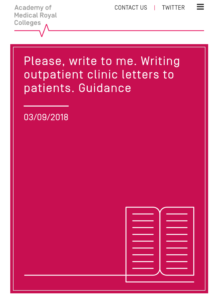Promoting patient empowerment through access to information
The Academy of Medical Royal Colleges recently (September, 2018) published a guide called “Please, Write to Me. Writing Outpatient Letters. Guidance.”
 This resource was kindly passed on to me by one of my higher degree research supervisors, who happens to be a physiotherapist. I really appreciate it when colleagues, friends, family members or students send me information or resources on topics they know I’m passionate about. Many of my current and former colleagues and students know very well just how passionate I can be on the topic of accessible information, plain language, and written-documents-that-are-lovely-to-read. I got so passionate one day after reading a letter that was sent to my elderly grandmother from Centrelink that I started this Facebook page: https://www.facebook.com/plainlanguageAustralia/ – because the language was so incredibly difficult to understand!
This resource was kindly passed on to me by one of my higher degree research supervisors, who happens to be a physiotherapist. I really appreciate it when colleagues, friends, family members or students send me information or resources on topics they know I’m passionate about. Many of my current and former colleagues and students know very well just how passionate I can be on the topic of accessible information, plain language, and written-documents-that-are-lovely-to-read. I got so passionate one day after reading a letter that was sent to my elderly grandmother from Centrelink that I started this Facebook page: https://www.facebook.com/plainlanguageAustralia/ – because the language was so incredibly difficult to understand!
I really appreciate it when colleagues, friends, family members or students send me information or resources on topics they know I’m passionate about.
But I am getting sidetracked from the purpose of this post which is the guideline. The first line on page 4 says it all:
“Writing letters directly to patients is in keeping with Good Medical Practice…”
Yes!
It also goes on to say that patients need letters in language they can understand.
Yes!
Patients of medial clinics who are already writing directly to them rather than their GPs are positive about the letters.
Yes!
Then, there’s the GPs, who also find their letters easier to understand and don’t need to spend as much time interpreting incomprehensible information.
Yes!
This guideline seems to have been welcomed by news outlets and blogs. The BBC took the opportunity to playfully poll a convenience sample of the public on some of the jargon usually used in correspondence between doctors: https://www.bbc.com/news/health-45394620
The Royal College of Physicians asks “What’s the big deal?” with the request to write to patients, highlighting a physician who has been doing this successfully for years with positive responses: https://www.rcplondon.ac.uk/news/writing-letters-patients-what-s-big-deal
I’m inclined to agree that this shouldn’t be a big deal, but it is. This is a big shift in practice for many practitioners in the medical system, and it has been a long time coming. This article in The BMJ from 2008 (https://www-bmj-com.ezproxy.lib.uts.edu.au/content/337/bmj.a2431), indicated the problem of health literacy and the cost to the health system and individual health outcomes (Godlee, 2008). By beginning to partner with patients through the simple act of writing directly to them about their health is having positive effects and needs to be supported. Support should take the form of encouragement and praise, but also more concrete supports like resources and training. We know that changing the language we use in our professional document is a very difficult thing to do and a focus on culture change is also important.
I’m inclined to agree that this shouldn’t be a big deal, but it is.
I think that asking patients and clients about what information they would like and how they would like it is the next crucial step in this journey of health literacy and information access. There are few studies that report on research that asks health consumers (patients, clients, teachers, parents etc) about the documents that are given to them, but when it happens the yield is very valuable. They tell us about what is helpful, parts of documents that are useful and the kind of information they find invaluable. (Groth‐Marnat, 2006; Makepeace & Zwicker, 2014)
I look forward to seeing more positive moves in this field in the future!
References:
Godlee, F. (2008). Patients are ready for partnership. BMJ, 337, a2431. https://doi.org/10.1136/bmj.a2431
Groth‐Marnat, G. (2006). Introduction to the special series on psychological reports. Journal of Clinical Psychology, 62(1), 1–4. https://doi.org/10.1002/jclp.20195
Makepeace, E., & Zwicker, J. G. (2014). Parent Perspectives on Occupational Therapy Assessment Reports. British Journal of Occupational Therapy, 77(11), 538–545. https://doi.org/10.4276/030802214X14151078348396